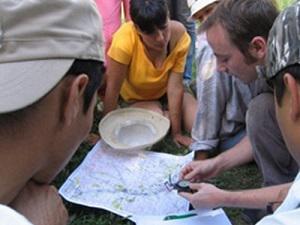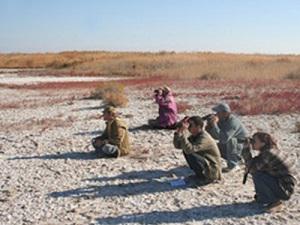Leylya Belyalova
This project aims to train and involve biology students in important nature conservation work in order to establish a new generation of researchers and scientists working for conservation in Uzbekistan.

Cartography training. ©Oleg Kashkarov.
Uzbekistan holds globally important biodiversity, especially large tracks of wilderness, notably incorporating a very significant number of predominately intact wetlands. Natural mountain, desert and semi-desert habitats are also characteristic for the country. In terms of the potential for conservation of birds, Uzbekistan is most impressive in terms of population sizes but also for species diversity, with many millions of birds migrating annually through the region.

Birdwatching at IBA Lake Rogatoe Kyzylkum desert. © Oleg Kashkarov.
At the same time the influence on Uzbekistan’s environment is very high – disturbance and destruction of ecosystems lead to a sharp loss of wildlife that can be noticed inside and outside nature reserves since the collapse of the Soviet Union.
In 2005 the British BirdLife partner together with a group of local ornithologists started its Important Bird Area (IBA) Programme in Central Asia. At the moment 234 IBAs have been identified in the region with 50 for Uzbekistan. The success of this project in Uzbekistan, especially the subsequent monitoring and further nature conservation activities greatly depend on the availability of a larger group of well-trained qualified ornithologists and conservationists. At the moment, the country is strongly lacking young qualified biologists. Low salaries and low motivation of teachers at universities as well as lack of technical equipment and other recourses negatively effect on the educational level, the preparation of young qualified nature conservationists and conservation work in the whole – regardless that there are increasing job opportunities for biologists and conservationists in the country.
This project aims to fill this gap and build a new generation of nature conservationists through supporting a network of already established birdwatching clubs at universities throughout the country.
The project consists of various components, which are: training and capacity building, basic field research and various nature conservation activities.
Special theoretical and practical trainings will allow students to monitor nearby IBAs. Nature conservation events organised by the students shall raise awareness of local people about their surrounding unique nature. By providing qualified and trained young, in-country conservationists this project provides a backbone for future conservation activities in Uzbekistan.